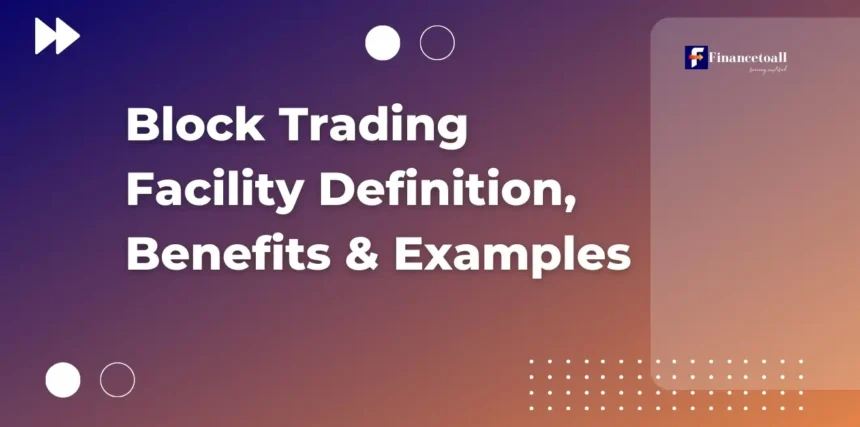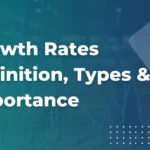Understanding Block Trading Facility (BTF)
Block Trading Facilities offer a specialized way for institutional investors to execute large trades without disrupting the market. By negotiating privately and leveraging technology like dark pools and algorithms, these platforms ensure liquidity, minimize slippage, and provide customizable trade options.
Key Takeaways
- Large Transactions, Minimal Impact: Block trading allows large orders to be executed outside public exchanges, reducing market impact and price fluctuations.
- Private and Confidential: Trades are executed discreetly through specialized platforms or brokers, ensuring anonymity for participants.
- Customizable Deals: Flexible terms allow parties to negotiate pricing, settlement, and other conditions tailored to their needs.
- Ideal for Institutions: Commonly used by institutional investors, hedge funds, and asset managers to handle large trades efficiently.
- Regulated Framework: Block trading facilities operate under strict regulations, ensuring transparency, fair pricing, and compliance with financial laws.
A Block Trading Facility (BTF) is a specialized platform that allows large-scale trades, commonly known as block trades, to be executed without disrupting the broader financial market. These facilities cater to institutional investors, such as hedge funds or pension funds, who need to buy or sell massive amounts of securities like stocks, bonds, or derivatives.
What is a Block Trade?
A block trade refers to a transaction involving a large number of financial instruments—typically much larger than the average trade size on public exchanges. These trades are negotiated privately and executed through platforms like BTFs, ensuring confidentiality and minimizing market impact.
For example, buying or selling 10,000 shares of a stock in a single transaction qualifies as a block trade. This size often exceeds the thresholds that can be processed efficiently on standard exchanges.
Why Do Block Trades Use BTFs?
Standard exchanges operate with high visibility and can lead to price volatility if a large order hits the open market. Block Trading Facilities provide a solution by keeping these transactions private, reducing slippage, and maintaining market stability.
Why Are Block Trades Important?
The Role of Block Trades in Financial Markets
Block trades play a vital role in maintaining liquidity for institutional investors. When large players want to adjust their portfolios or hedge risks, they rely on these facilities to avoid disrupting the market. For example, if a hedge fund needs to sell a substantial stake in a company, executing the trade on a standard exchange would cause prices to drop before the sale is completed.
Challenges in Standard Trading
Executing large trades on public exchanges comes with challenges like:
- Price Impact: A massive order can push prices up or down, making it more expensive to complete the transaction.
- Market Disruption: Other market participants might notice the large order and react, creating additional volatility.
Block Trading Facilities address these issues by offering privacy and flexibility, ensuring trades can be completed efficiently without alarming the market.
The Regulatory Framework Around Block Trading
How Regulations Govern Block Trading
Block trades are subject to strict oversight to maintain market integrity and prevent potential misuse. In the U.S., for example, the SEC enforces rules to ensure transparency in large transactions. In Europe, MiFID II sets guidelines for pre-trade and post-trade reporting of block trades to foster accountability.
Compliance and Reporting Requirements
While block trades enjoy a certain degree of privacy, they are not exempt from compliance:
- Reporting Requirements: After the trade is completed, it must be disclosed to regulators, ensuring that markets remain informed.
- Anti-Manipulation Safeguards: Regulatory bodies monitor for practices like insider trading or front-running (acting on information before the block trade is executed).
In short, regulations aim to strike a balance—facilitating efficient execution for institutional traders while safeguarding market transparency.
How Block Trades Work: The Mechanics of Block Trading
How Block Trades Are Negotiated
Block trades are not executed like regular trades on public exchanges. Instead, these transactions are privately negotiated between the buyer and the seller, often with the assistance of intermediaries. The goal is to agree on a fair price for the large volume of securities while avoiding price disruption in the open market.
Here’s how it typically works:
- Initiation: An institutional investor (such as a hedge fund) decides to buy or sell a large quantity of a security.
- Intermediary Involvement: A broker, dealer, or trading desk steps in to facilitate the negotiation between the buyer and seller.
- Price Agreement: Both parties agree on a price that balances the quantity being traded with current market conditions.
- Execution: The trade is executed privately, often through specialized platforms like block trading facilities or OTC systems.
Role of Intermediaries
Brokers and trading desks play a crucial role in block trading. They:
- Source Liquidity: Find counterparties willing to trade the large volume.
- Negotiate Terms: Work to achieve a mutually agreeable price.
- Manage Risk: Ensure that the transaction is completed efficiently, minimizing risks like counterparty default.
The Role of OTC Systems and Private Platforms
Block trades are often conducted through Over-the-Counter (OTC) systems or private trading platforms such as dark pools. These venues offer:
- Anonymity: Ensuring that large trades don’t attract attention and affect market prices.
- Customization: Allowing the parties to tailor the trade to specific needs, including unique settlement terms.
- Efficient Execution: Preventing market volatility by keeping large orders off public exchanges.
Regulatory Framework Around Block Trading
Regulations in Financial Markets
Block trades operate under strict regulatory oversight to ensure fairness, transparency, and market stability. While these trades enjoy certain privacy benefits, regulators enforce rules to prevent market abuse.
Here are key regulatory frameworks in major financial markets:
- U.S. (SEC Rules):
- Block trades are reported to regulators post-trade, ensuring market transparency.
- Strict monitoring prevents practices like insider trading or price manipulation.
- Trading facilities must comply with the Securities Exchange Act and provide safeguards for large transactions.
- Europe (MiFID II):
- The Markets in Financial Instruments Directive II (MiFID II) sets guidelines for both pre-trade transparency and post-trade reporting.
- It requires block trades to be conducted on authorized platforms, ensuring regulatory compliance.
- Global Compliance Standards:
- Different regions have their own block trading regulations, but most enforce reporting standards and monitor for anti-competitive practices.
Compliance and Reporting Requirements
Although block trades are executed privately, they must adhere to these key requirements:
- Trade Reporting: Once a block trade is completed, details must be submitted to regulators. This ensures that markets remain informed without exposing sensitive information prematurely.
- Audit Trails: Regulators require complete documentation of the trade to investigate any unusual activities.
- Fair Pricing Checks: Platforms and intermediaries must validate that the agreed-upon price reflects market conditions and doesn’t unfairly advantage one party.
Balancing Privacy and Transparency
Regulations aim to maintain a balance:
- For Traders: Block trading offers the privacy needed to execute large trades without impacting the market.
- For the Market: Reporting rules ensure that these trades don’t undermine market transparency or fairness.
This balance enables institutional investors to transact efficiently while upholding trust in financial markets.
Key Features of Block Trading Facilities
Privacy and Confidentiality: Protecting Large Transactions
One of the standout features of Block Trading Facilities (BTFs) is their ability to maintain privacy and confidentiality. Large transactions are kept out of the public eye to:
- Prevent price impact caused by market participants reacting to large trades.
- Ensure the anonymity of buyers and sellers, reducing the risk of front-running (where traders act on anticipated moves before a trade is completed).
For example, if a hedge fund wants to sell millions of shares in a company, executing this through a BTF keeps the trade discrete, preserving market stability.
Flexibility in Customizing Trade Terms
BTFs allow counterparties to tailor their trades according to specific needs, which isn’t possible on standard exchanges. This flexibility includes:
- Negotiated Pricing: Agreeing on a fair price based on volume and market conditions.
- Settlement Timelines: Customizing settlement dates to match liquidity requirements.
- Tailored Agreements: Adapting the terms to suit unique financial strategies or objectives.
This level of personalization ensures that both parties achieve their desired outcomes efficiently.
Reduced Market Impact
When large trades are executed on standard exchanges, they can disrupt the market by:
- Moving prices significantly.
- Triggering algorithms that amplify volatility.
Block Trading Facilities mitigate this risk by executing trades off-exchange, away from public order books. This means:
- Lower Slippage: Prices remain stable before, during, and after the trade.
- Controlled Market Behavior: Avoiding unnecessary panic or speculation by other traders.
Who Uses Block Trading Facilities?
The Main Market Participants
Block Trading Facilities are primarily used by institutional investors—large entities that manage significant portfolios. Key participants include:
- Hedge Funds: Seeking to adjust large positions or hedge risks without disrupting the market.
- Pension Funds: Managing diversified portfolios that require periodic rebalancing.
- Mutual Funds: Executing trades to maintain liquidity while minimizing costs.
- Insurance Companies: Balancing long-term investments with strategic adjustments.
- Investment Banks: Facilitating trades on behalf of their clients or proprietary trading desks.
Why These Participants Prefer Block Trading
These investors prefer block trading because:
- Efficient Handling of Large Volumes: Traditional exchanges aren’t designed to process massive trades without causing price volatility.
- Cost Savings: By avoiding price slippage and other execution costs, BTFs make large trades more economical.
- Discretion: Institutional players value privacy to prevent competitors from tracking their strategies or market moves.
- Speed and Reliability: Block trades are completed quickly and securely, reducing risks tied to market exposure.
For instance, if a mutual fund wants to invest heavily in a promising tech stock, using a Block Trading Facility ensures it can do so without driving up the price.
What Assets Are Traded in Block Facilities?
Types of Assets Commonly Traded
Block Trading Facilities are versatile platforms designed to handle a wide range of asset classes. Here are the most commonly traded assets:
- Equities (Stocks): Large trades in shares of publicly traded companies. For instance, institutional investors might sell or acquire millions of shares in one transaction.
- Fixed Income Securities: Bonds and other debt instruments are frequently traded in blocks, especially by pension funds or insurance companies managing long-term obligations.
- Derivatives: Instruments like options, futures, or swaps are used for hedging or speculative strategies. These are often customized to suit counterparties.
- Commodities: Physical goods like oil, gold, or agricultural products can be traded in bulk, particularly in the energy and industrial sectors.
- Exchange-Traded Funds (ETFs): ETFs are popular for block trades due to their ability to provide diversified exposure in a single transaction.
Approaches for Different Asset Classes
Each asset class requires a tailored approach in block trading:
- Equities: Trades are priced based on the stock’s average market price to minimize market impact.
- Fixed Income: Bonds are less liquid than equities, so pricing negotiations focus on yield and credit risk.
- Derivatives: These often involve complex terms, such as notional values, expiration dates, and counterparty obligations, making them highly customized.
- Commodities: Transactions may include storage or delivery agreements, depending on whether the commodity is physical or financial.
By supporting diverse asset types, Block Trading Facilities provide the flexibility that institutional investors need for managing their portfolios.
Why Use Block Trading Facilities? The Key Benefits
Minimized Market Impact
One of the biggest advantages of Block Trading Facilities is their ability to reduce market impact. Large trades executed on public exchanges can:
- Cause price fluctuations due to visible order book activity.
- Alert other market participants, leading to increased competition or volatility.
Block trading keeps transactions private, ensuring that prices remain stable and the trade doesn’t disrupt the market.
Enhanced Liquidity for Large-Volume Trades
For institutional investors, liquidity is critical. Block Trading Facilities provide:
- Access to deep pools of liquidity, enabling large transactions to be completed without delays.
- Greater certainty in finding counterparties for trades involving vast quantities of securities.
Increased Efficiency for Complex Trades
Block trades are often more intricate than standard market orders. These facilities streamline the process by:
- Allowing customized terms, such as flexible pricing or unique settlement arrangements.
- Reducing execution time, so large trades can be completed quickly, minimizing risk exposure.
For example, if a pension fund needs to rebalance its portfolio by selling corporate bonds and buying equities, a Block Trading Facility can handle both trades efficiently.
By minimizing risks, improving execution quality, and ensuring liquidity, these facilities make it easier for institutional investors to achieve their financial objectives.
Risks and Limitations of Block Trading Facilities
Counterparty Credit Risk
One of the primary risks in block trading is counterparty credit risk. Since trades are often executed off-exchange, the parties involved must trust that the other side will honor the trade. If a counterparty fails to fulfill their obligations, it could result in:
- Financial losses.
- Legal disputes.
- Delayed settlements, especially in volatile markets.
Operational Risk
Operational challenges can also arise in block trading, such as:
- System Failures: Issues in trading platforms or communication systems can disrupt execution.
- Human Errors: Mistakes in negotiation, pricing, or reporting can lead to incorrect trades or regulatory scrutiny.
Potential Lack of Transparency
Block trades are designed to prioritize privacy, but this can also create a lack of transparency for the broader market. Unlike standard exchanges where trades are visible, block trades:
- May not contribute to price discovery, making it harder for others to gauge fair market values.
- Could lead to concerns about market manipulation if not properly monitored.
Liquidity Challenges
Although block trading facilities provide access to liquidity for large trades, they are not always suitable for:
- Less Liquid Securities: Such as small-cap stocks or niche bonds, where finding counterparties can be challenging.
- Highly Volatile Markets: Where prices may shift rapidly, making execution more difficult.
While block trading facilities offer efficiency and privacy, investors need to weigh these risks carefully before engaging in large-scale trades.
Technological Innovations in Block Trading
Electronic Trading Platforms
Technology has revolutionized block trading, making it faster and more efficient. Electronic trading platforms provide:
- Real-Time Execution: Enabling traders to complete block trades quickly with minimal market impact.
- Improved Transparency: Platforms often offer post-trade reporting to satisfy regulatory requirements.
- Global Reach: Facilitating cross-border trades by connecting investors from different regions.
Dark Pools: A Key Advancement
Dark pools are a type of private electronic trading venue designed for large trades. They offer:
- Anonymity: Keeping buyer and seller identities hidden during the trade.
- Reduced Market Impact: Allowing large orders to be executed without revealing their size to the broader market.
Dark pools have become a popular choice for institutional investors looking to optimize their trading strategies.
The Role of Algorithms and Automation
Algorithms and automated systems have further enhanced block trading by:
- Optimizing Execution: Algorithms can split large orders into smaller chunks to minimize market impact, a strategy called order slicing.
- Price Efficiency: Using real-time data to calculate fair prices for both parties.
- Risk Mitigation: Monitoring market conditions and adjusting execution strategies on the fly to reduce risk.
Emerging Innovations
New technologies continue to shape the future of block trading:
- Blockchain and Distributed Ledgers: Offering enhanced security and transparency for trade settlements.
- Artificial Intelligence (AI): Predicting market trends and identifying optimal execution strategies.
- Smart Order Routing (SOR): Automatically directing trades to the venue offering the best price and liquidity.
By integrating these advancements, block trading facilities are becoming more robust, efficient, and adaptable to the evolving needs of institutional investors.
How Block Trading Compares to Other Trading Methods
Block Trading vs. Standard Market Trades
- Execution: Block trades are negotiated privately, often outside public exchanges, whereas standard trades occur directly on exchanges with visible order books.
- Market Impact: Block trades avoid slippage and price fluctuations, while standard trades are susceptible to market impact due to their visibility.
- Regulation: Both are subject to regulatory oversight, but block trades require specialized reporting to ensure compliance without compromising privacy.
- Cost: Block trading facilities may charge higher fees for privacy and customization, while standard trading involves brokerage or exchange fees.
Example: A mutual fund selling 1,000,000 shares of a stock would likely prefer a block trade to avoid driving down the stock price, unlike a retail investor trading a few hundred shares on the open market.
Block Trading vs. Program Trading
- Scope: Program trading involves executing multiple trades (often in equities or ETFs) as part of a broader strategy, whereas block trading focuses on single large transactions.
- Automation: Program trades often use algorithms for execution, while block trades may involve human negotiation alongside algorithmic assistance.
- Flexibility: Block trading allows for customized terms, whereas program trades are typically pre-defined by the trading strategy.
Both methods leverage technology but serve different purposes—block trades for large, single transactions and program trading for strategic portfolio adjustments.
Real-World Examples of Block Trading
Case Study: Facebook IPO
During Facebook’s IPO, institutional investors engaged in large block trades to either acquire significant stakes or reduce exposure. These trades were conducted discreetly through block trading platforms, ensuring the broader market wasn’t affected during the stock’s debut.
Notable Block Trading Platforms
- Bloomberg Tradebook:
- A well-known platform that combines transparency and privacy for block trades.
- Provides tools for price discovery and post-trade reporting, catering to institutional investors.
- Liquidnet:
- A platform specifically designed for institutional block trades.
- Known for offering deep liquidity pools and anonymity, Liquidnet is popular among mutual funds and pension funds.
Outcome: The Role of BTFs in Market Stability
In high-profile cases, block trades facilitated by these platforms helped:
- Minimize market volatility during major corporate events like IPOs, mergers, or acquisitions.
- Ensure that large trades were executed efficiently without drawing undue attention or impacting prices.
These examples highlight the critical role block trading facilities play in maintaining liquidity and market stability for large-scale institutional transactions.
Impact of Block Trading on Market Dynamics
How Block Trading Influences Liquidity
Block trading facilities enhance liquidity by providing a platform where large buyers and sellers can transact without disrupting the market. This additional liquidity benefits institutional investors who require significant volumes to meet their objectives. However:
- Block trades remove some liquidity from public exchanges, which can slightly reduce visible market depth.
- They also attract institutional activity to private venues, which can centralize liquidity in off-exchange platforms.
Effect on Market Volatility
Block trading reduces volatility by keeping large trades private:
- Stabilizing Prices: When large orders are executed outside of public exchanges, it prevents sudden price spikes or drops.
- Controlled Movements: By avoiding exposure to other market participants, block trades minimize speculative reactions.
That said, in markets with limited liquidity, frequent block trades can occasionally affect price stability if not managed carefully.
Impact on Price Discovery
Price discovery is the process by which markets determine the fair price of a security. Block trading has a mixed impact:
- Positive: By facilitating large trades, block facilities reveal institutional demand and supply, indirectly contributing to price discovery.
- Negative: Since block trades often occur off-exchange and may not reflect real-time market conditions, they can temporarily limit price transparency.
Influence on Broader Market Trends
Block trading has led to:
- Increased use of dark pools and other private platforms.
- A focus on regulatory efforts to balance privacy with transparency.
- Greater emphasis on technology to handle complex, large-scale trades efficiently.
Overall, block trading stabilizes markets by offering liquidity solutions for institutional players, though it sometimes challenges the traditional price discovery process.
Trends and Future Outlook for Block Trading Facilities
Recent Trends in Block Trading
- Growing Demand for Alternative Asset Classes:
- Block trading has expanded beyond equities to include commodities, cryptocurrencies, and private debt instruments.
- Institutional investors increasingly seek out block trades for diversification and strategic rebalancing.
- Regional Growth:
- The Asia-Pacific region has seen significant growth in block trading facilities, driven by increasing institutional activity and regulatory modernization.
- European markets, under MiFID II, are fostering greater transparency, encouraging institutional adoption.
- Rising Importance of ESG Investments:
- Institutions trading large blocks of ESG-compliant assets are leveraging block trading platforms for sustainable investments.
The Future of Block Trading Facilities
- Technological Integration:
- AI and Machine Learning: Predictive algorithms will enhance trade execution by analyzing market conditions and optimizing pricing strategies.
- Blockchain Technology: Distributed ledgers could improve settlement efficiency and transparency while reducing counterparty risk.
- Smart Contracts: Automated execution of complex terms will make block trades faster and more secure.
- Increased Regulatory Oversight:
- Governments and regulators are likely to impose stricter reporting and transparency requirements, balancing privacy with market integrity.
- Enhanced frameworks may promote trust, attracting more institutional participation.
- Dark Pool Evolution:
- Dark pools will continue to evolve, integrating with advanced analytics and compliance tools to remain competitive.
- Global Standardization:
- Cross-border collaboration among regulators may lead to standardized rules for block trading, simplifying processes for global institutional investors.
The Bottom Line
Block trading facilities are set to become even more critical as financial markets grow more complex. The combination of advanced technology, evolving regulations, and increasing institutional demand positions block trading as a cornerstone of modern financial market infrastructure. Institutions that adapt to these trends will gain a significant edge in managing large-scale transactions efficiently.
Educational Tips for Market Participants: Making the Most of Block Trading Facilities
For New Investors and Institutions: A Step-by-Step Guide
- Understand the Basics of Block Trading
- Before diving in, ensure you’re familiar with how block trading works, its benefits, and its limitations.
- Block trading is primarily suited for institutional investors or large-scale traders. Smaller retail investors typically do not engage in these facilities.
- Evaluate Whether Block Trading Meets Your Needs
- Consider block trading if you:
- Frequently trade large volumes.
- Seek to minimize market impact and maintain transaction privacy.
- Need customized trade terms or unique settlement options.
- Consider block trading if you:
- Choose the Right Block Trading Platform
- Look for a platform that aligns with your trading objectives:
- Liquidity: Ensure the facility provides access to deep liquidity pools.
- Technology: Opt for platforms with advanced analytics, algorithmic trading options, and secure systems.
- Reputation: Research platforms like Bloomberg Tradebook or Liquidnet, which are trusted by institutional investors.
- Look for a platform that aligns with your trading objectives:
- Understand the Asset Classes
- Identify the types of securities you trade most frequently (e.g., equities, fixed income, derivatives) and ensure the platform supports those assets efficiently.
Best Practices for Successful Block Trading
- Conduct Thorough Due Diligence
- Research the counterparties involved in the trade to ensure they are reputable and financially stable.
- Confirm the platform’s regulatory compliance and track record.
- Prioritize Risk Management
- Use tools and strategies to mitigate counterparty credit risk and operational risks.
- Work with intermediaries or brokers to secure the best terms and safeguard your trades.
- Leverage Technology
- Utilize platforms with algorithmic capabilities to optimize execution and minimize slippage.
- Consider platforms offering real-time analytics for improved decision-making.
- Stay Informed on Regulations
- Familiarize yourself with the regulatory requirements in your region (e.g., MiFID II in Europe, SEC rules in the U.S.).
- Ensure all trades are properly reported to avoid penalties and maintain compliance.
- Engage Professional Expertise
- Collaborate with experienced brokers, trading desks, or advisors to navigate the complexities of block trading.
- Consider hiring specialists for risk assessment and strategy optimization.
Key Considerations Before Engaging in Block Trades
- Trade Size: Ensure the transaction size justifies the use of block trading facilities.
- Cost vs. Benefit: Evaluate the costs of the facility (fees, intermediary charges) against the savings from reduced market impact.
- Timing: Plan the trade strategically to minimize external risks, such as volatility or major economic events.
- Transparency Needs: While block trading offers privacy, ensure you’re comfortable with the trade-off between transparency and discretion.
Final Thoughts
Block trading facilities are powerful tools for institutional investors looking to execute large trades efficiently. By focusing on due diligence, leveraging technology, and choosing the right platforms, market participants can maximize the benefits of block trading while minimizing risks. New investors or institutions should start with small trades, gradually building their expertise and confidence in this sophisticated trading method.
Frequently Asked Questions (FAQ) About Block Trading Facilities
1. What is a Block Trading Facility (BTF)?
A Block Trading Facility is a platform designed for executing large-scale transactions (block trades) privately and efficiently. These facilities cater to institutional investors who need to buy or sell large quantities of securities without disrupting the market.
2. Who uses Block Trading Facilities?
Block Trading Facilities are primarily used by:
Hedge funds
Pension funds
Mutual funds
Insurance companies
Investment banks These institutions rely on BTFs to manage large trades discreetly and efficiently.
3. What types of assets can be traded in Block Trading Facilities?
Common assets traded include:
Equities: Large stock transactions.
Fixed Income Securities: Bonds and other debt instruments.
Derivatives: Options, futures, and swaps.
Commodities: Physical and financial contracts for goods like oil or gold.
ETFs: Exchange-traded funds for diversified portfolios.
4. How do Block Trades differ from standard trades?
Privacy: Block trades are conducted off-exchange to maintain anonymity.
Size: They involve much larger transaction volumes.
Customization: Terms like pricing and settlement are tailored to meet the needs of both parties.
5. Are Block Trades regulated?
Yes, block trades are subject to regulatory oversight to ensure market integrity:
In the U.S., the SEC mandates post-trade reporting and anti-manipulation rules.
In Europe, MiFID II enforces pre-trade and post-trade transparency.
6. What are the main benefits of using Block Trading Facilities?
Key benefits include:
Reduced Market Impact: Large trades don’t disrupt prices.
Enhanced Liquidity: Easy access to deep pools of liquidity.
Efficiency: Streamlined execution for complex or large-volume trades.
7. What are the risks associated with block trading?
Counterparty Credit Risk: The risk that one party might default on the trade.
Operational Risk: Issues like system failures or errors in execution.
Transparency Concerns: Limited visibility can impact price discovery.
8. What platforms are commonly used for block trading?
Some popular platforms include:
Bloomberg Tradebook
Liquidnet
Instinet These platforms are designed to provide privacy, liquidity, and efficient execution for institutional investors.
9. How does technology play a role in block trading?
Technological advancements include:
Algorithms: To optimize execution and minimize slippage.
Dark Pools: For anonymous trading with reduced market impact.
Blockchain: Enhancing transparency and settlement efficiency.
10. Is block trading suitable for retail investors?
No, block trading is primarily designed for institutional investors managing large portfolios. Retail investors typically use public exchanges for their trades.












